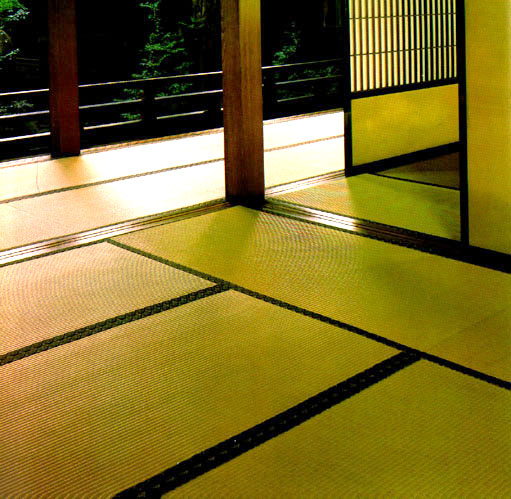August 2001 QUESTIONS
- (Donald, Australia)
What is tatami?
 Tatami
is a mat used as a flooring material in traditional Japanese-style
rooms. Since the Muromachi period (1338-1573) tatami have been
made of a thick base of straw covered with a soft surface of woven
rush. A single tatami usually measures 1.91 by 0.95 meters
(6.3 by 3.1 feet). In Japan the size of rooms, Western and Japanese-style
alike, are often measured in terms of "mats of tatami." Tatami
flooring is cool in the summer and warm in the winter and remains
fresher than carpet during Japan's humid months. Tatami
is a mat used as a flooring material in traditional Japanese-style
rooms. Since the Muromachi period (1338-1573) tatami have been
made of a thick base of straw covered with a soft surface of woven
rush. A single tatami usually measures 1.91 by 0.95 meters
(6.3 by 3.1 feet). In Japan the size of rooms, Western and Japanese-style
alike, are often measured in terms of "mats of tatami." Tatami
flooring is cool in the summer and warm in the winter and remains
fresher than carpet during Japan's humid months.
-
(Gary)
What does futon mean?
A futon is a traditional form of Japanese bedding. It is made up of
a shikibuton (quilt-like mattress), which you lie on, and a
kakebuton (quilted bedcover), which covers you and keeps you
warm. A futon can be easily folded up and stored away when it is not
in use, which is a great space saver.
-
(Stacey)
Who was Sadako? How old was she when she died?
Sadako Sasaki was a girl who became famous for folding hundreds of
origami cranes while
she was dying from leukemia. Sadako was born in 1943 and lived in
Hiroshima, where an atomic bomb was dropped in August 1945. When she
was 11 years old, Sadako became sick because of radiation from the
bomb. Her best friend told her about a Japanese legend that folding
1,000 paper cranes would bring a person a long life, so Sadako began
to fold cranes. She died in 1955, at the age of 12, before she could
make 1,000 cranes, but her best friend folded the rest. Now the paper
crane has become a symbol of peace, and every year children from all
over the world send thousands of cranes to Hiroshima to commemorate
Sadako's story and to pray for peace. Find out how to fold a paper
crane in our Virtual Culture
section.


|
 Tatami
is a mat used as a flooring material in traditional Japanese-style
rooms. Since the Muromachi period (1338-1573) tatami have been
made of a thick base of straw covered with a soft surface of woven
rush. A single tatami usually measures 1.91 by 0.95 meters
(6.3 by 3.1 feet). In Japan the size of rooms, Western and Japanese-style
alike, are often measured in terms of "mats of tatami." Tatami
flooring is cool in the summer and warm in the winter and remains
fresher than carpet during Japan's humid months.
Tatami
is a mat used as a flooring material in traditional Japanese-style
rooms. Since the Muromachi period (1338-1573) tatami have been
made of a thick base of straw covered with a soft surface of woven
rush. A single tatami usually measures 1.91 by 0.95 meters
(6.3 by 3.1 feet). In Japan the size of rooms, Western and Japanese-style
alike, are often measured in terms of "mats of tatami." Tatami
flooring is cool in the summer and warm in the winter and remains
fresher than carpet during Japan's humid months.
